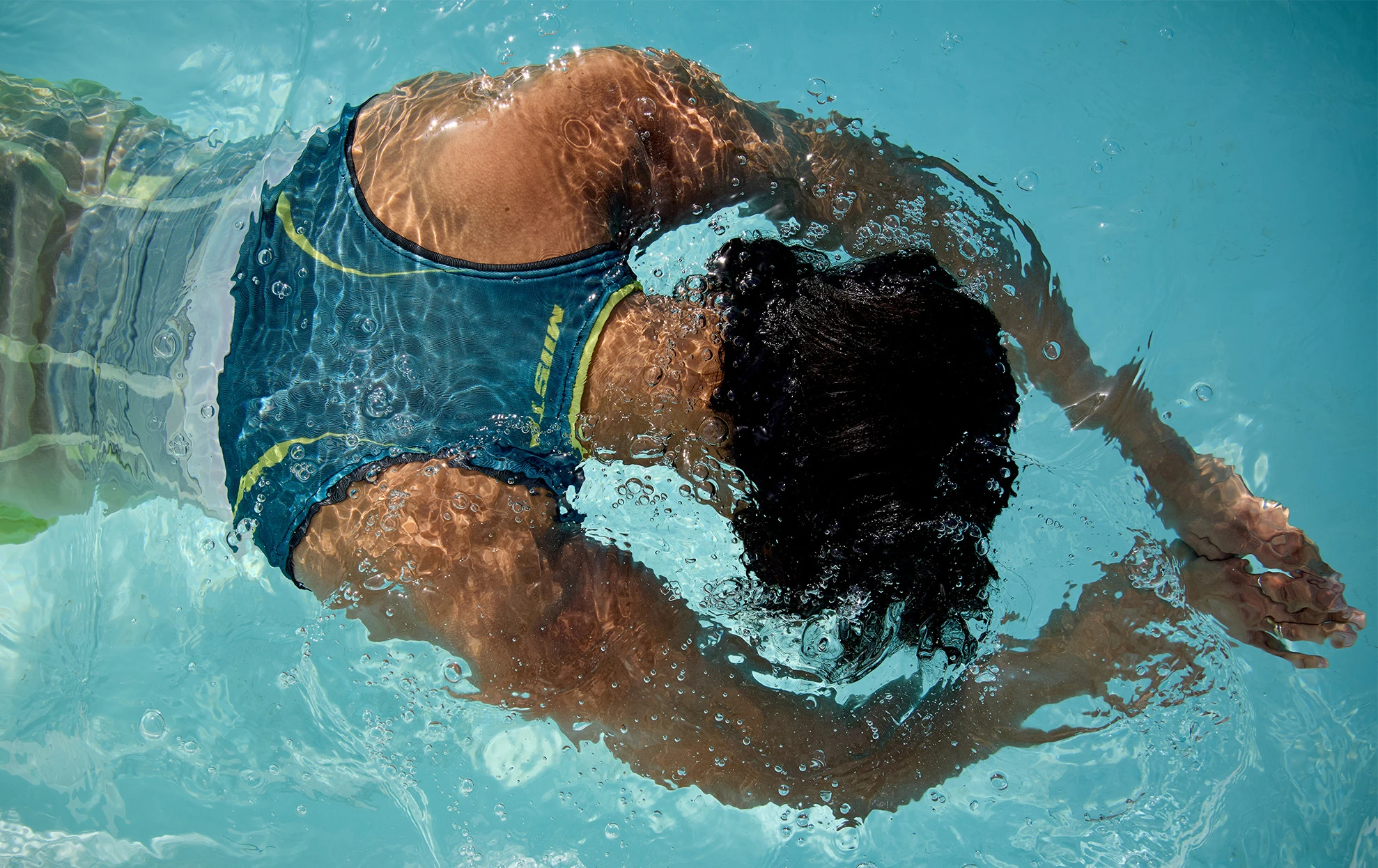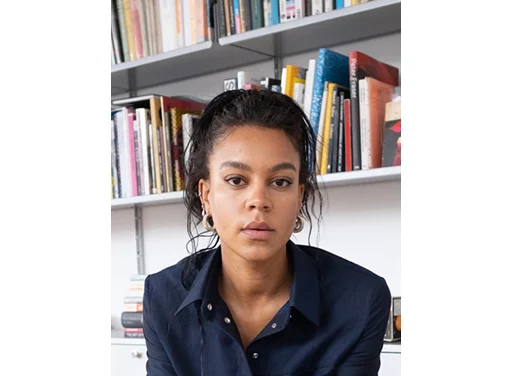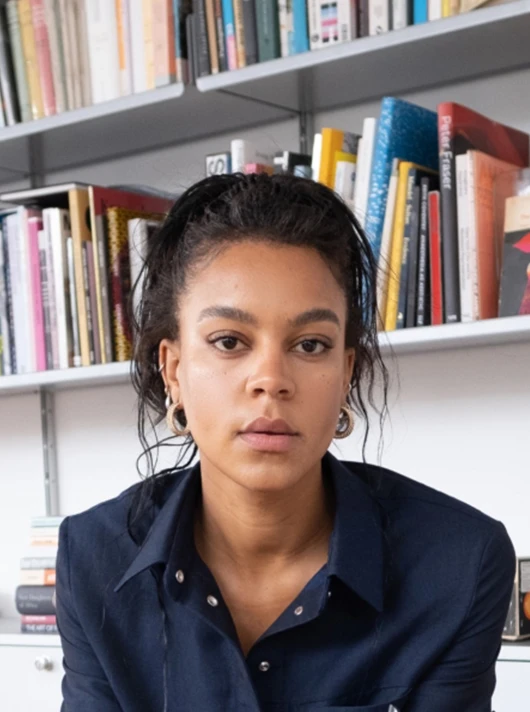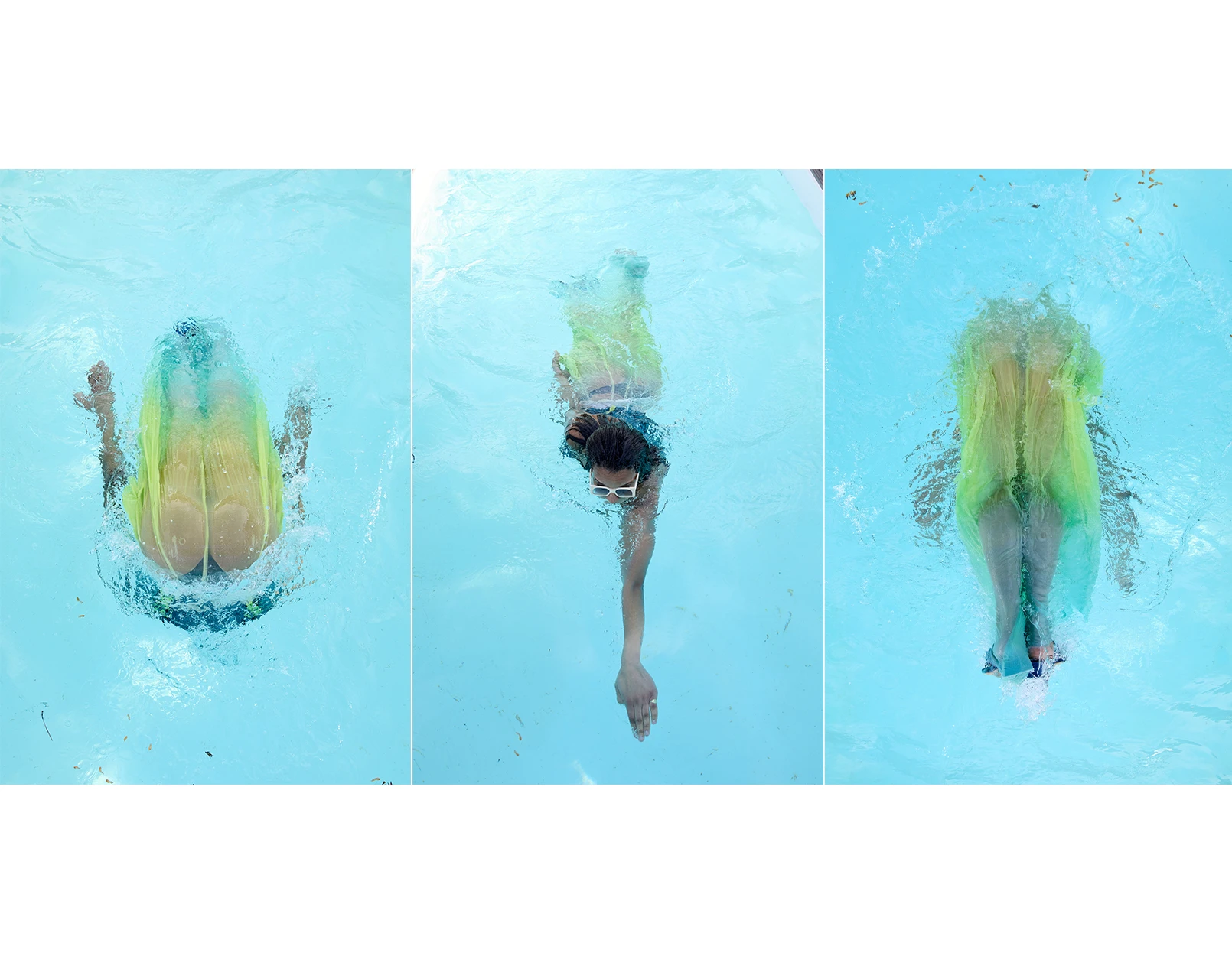MIISTA TALKS: REBECCA ACHIENG AJULU-BUSHELL
Iona Jackson
Thu May 04 2023
Rebecca Achieng Ajulu-Bushell is a name you might remember.
As a teenager, she swam competitively and professionally for Kenya then Great Britain, becoming the first Black woman to swim for the latter. It’s a title that’s weighed heavily on Rebecca – a load that’s only become a little lighter quite recently.
But what you need to know about Rebecca is that she’s so much more than just that one title. Swimmer? Yes. But also artist? Filmmaker? Business-founder? Non-profit CEO? Writer? Yes, yes, yes, yes, and yes. And now model, actually – we just shot her in our SS23 21 Miles campaign.
So after the shoot (and just ahead of the exciting recent announcement of her debut book, These Heavy Black Bones) we dialled in for a long chat with this incredibly multifaceted woman. From her life in the water to life on dry land – we covered all sorts: identity, race, writing, art and the void... as well as where she's shipping herself off to take a break this summer.
We were completely bowled over by Rebecca. And we think you might be too. Her wit, warmth, enormous intellect, and her strength as she takes her journey fully in her stride... if you didn’t already remember her name, you won’t be likely to forget it any time soon.
You hold the title of first Black woman to swim for Great Britain. How does that feel?
It's definitely been a vessel through which I've understood my own mixed race identity – and I think being mixed race is a very specific burden. You’re separated from two parts of your identity in ways that you can't really disentangle. I wear the colour of my skin every day and I can't change that, but also there are parts of Blackness that aren't meant for me… and then there’s also benefits and privileges I have as a light-skinned Black woman.
So I think being the first black woman to swim for Great Britain was a really formative part of my understanding of Blackness when I was younger. I didn't feel Black at that point in time. That's so horrifying to say out loud now. It's such a weird thing to even admit, because there's no greater pride than the pride I take in being a Black woman and that being a part of my identity.
But when you're fifteen or sixteen, you just want to fit in. That's like your modus operandi. You don't want to be different. And growing up in a really white world, it was the way I understood my own existence. So swimming taught me who I am. And that title definitely helped me to understand myself and how I fit into the world, and the wider picture of history of Blackness and being. But it wasn't without its struggle.
You obviously no longer swim professionally, so we wondered – have you ever felt like that title is something you want to get away from? Or do you still feel it to be a really important part of who you still are?
Yes – I ran from it for so long, and I've only just stopped doing that really recently. I became British champion when I had just turned sixteen, and that was back in 2010. And that was the moment when I qualified for the Commonwealth Games and European Championships, which saw me become the first black woman to swim for Team GB.
Swimming is a particularly white sport. So the immensity of pressure that put on my career – on top of the pressure to perform and the pressure to win – was the pressure to be the first, to prove people wrong, and to swim against narratives that had seen people like me not compete in those spaces. You know, I didn't want that title when I had it. And certainly I didn't want it for many years afterwards. I wanted it to kind of disappear, and to rub out that part of my life.
It wasn't until the re-eruption of the BLM movement in 2020 – and when Alice Dearing qualified for the Olympic Games and that stuff hit the press again – that I felt, ten years later, it was finally time for me to figure out how to own it, how to sit with it, and to kind of be okay with what it meant.
For a long time, I felt like I had to have the answers to the questions that title posed. Like 'why don't Black people swim?', 'why you?', 'what are we going to do to fix this problem?' And I was like 'I'm seventeen, I don't fucking know how to fix this problem!' But now I've realised I don't need to have all the answers, and maybe just sharing my experience is enough.
''But when you're fifteen or sixteen, you just want to fit in. That's like your modus operandi. You don't want to be different. And growing up in a really white world, it was the way I understood my own existence. So swimming taught me who I am. And that title definitely helped me to understand myself and how I fit into the world, and the wider picture of history of Blackness and being. But it wasn't without its struggle.''
And we hear you’re set to share those experiences in a very exciting way..?
Yes! It's called These Heavy Black Bones and it’s a narrative non-fiction book – a memoir, but I think it reads a little bit more like a novel. My life from age seven to seventeen is depicted and plays out both in and out of the water. It's a book about coming of age, but it’s also about institutions and power imbalances, the abuse of sport, race, and racism. I guess it’s about what I think the truth of all that is and what it means.
But I've always wanted to write; I think, hand in hand with swimming, writing is one of the greatest loves of my life. And this book felt like it had to come first – it felt like the thing that I had to write. So it's being published by Canongate and it comes out next year! Just before the Olympics in June 2024.
Well, needless to say, we can’t wait for it to come out so we can all read it. It sounds beautiful and important – huge congratulations for writing it and getting it out there.
Swimming aside, you’ve actually had a hugely creative output – particularly over the last ten years or so. After you retired from swimming, you transitioned into filmmaking, right?
So I quit the Olympic team at the end of 2011, just before the 2012 Olympic games, and I went to Oxford – to the Ruskin School of Art, which is very holistic in its approach. It's physical making, but it's also philosophy, art history, art theory, etc. And it's as intense and as pretentious as you can imagine it would be – and obviously I was the only Black student in my year.
I started off drawing and painting, then I got into photography really quickly, which then quite naturally took me into film. And so I made these really political films. It was 2015 when I graduated from university and it was the first eruption of the BLM movement in Ferguson in the U.S. I made this really political film about it, and everyone was like '...no'. Which is hilarious because now everyone's like – this is so important!
You were ahead of your time!
Right! But I carried on filmmaking. And then, when I was 22, my father died. He was full of contradictions like all of us, but he was a political freedom fighter, an academic, a great thinker, and a great rebel. He fought post-colonial struggles in Kenya (which is where we’re from) and he was really involved in the apartheid resistance in South Africa.
And so – having been someone whose parents have never paid my rent – I obviously can't afford to be an artist. But, I have always wanted to make and create. I think writing's always been my first love but documentary filmmaking feels very close to that. So I made this film called Breakfast in Kisumu, which is about my relationship with my father, and our relationship with our homeland, and I guess his relationship to Africa – his journey from being exiled to returning. It feels very proxy-archival, like a filmic essay.
And it's a very beautiful film! We got nominated for lots of awards. But because I was so pretentious, thinking 'I just make good art', I didn’t really talk about it. And so obviously there were no stakeholders in the film's success. So afterwards, when I was waiting for the phone to ring… it never did!
So, yes – I made this very obscure documentary film which you can watch online if you want to! Hopefully I'll make my way back to filmmaking at some point… if I have something else to say.
I’m sure you will – what a journey you’ve had. And now you’re the CEO at 10,000 Interns! Could you tell us about the organisation and what you do there?
The 10,000 Interns Foundation is a charity that exists to champion underrepresented talent in the workplace. We partner with around 700 companies and organisations to create paid internship opportunities for the incredible underrepresented talent that’s furthest away from these kinds of opportunities. Initially that was Black students and graduates – but we've also just launched a new programme for students and graduates with disabilities of all ethnicities. By the end of this summer we'll have created over 5,000 paid internships in just three years, which feels hugely significant.
It's going to be really interesting over the next couple of years to see what that impact looks like as all the people who come through our programme actually join the workforce full time. Because representation also does a lot to break down these barriers and to dispel myths around imposter syndrome. And although it's not the whole answer, I think if you can see it, there’s more chance you believe that you can be it.
''The 10,000 Interns Foundation is a charity that exists to champion underrepresented talent in the workplace. We partner with around 700 companies and organisations to create paid internship opportunities for the incredible underrepresented talent that’s furthest away from these kinds of opportunities. Initially that was Black students and graduates – but we've also just launched a new programme for students and graduates with disabilities of all ethnicities. By the end of this summer we'll have created over 5,000 paid internships in just three years, which feels hugely significant. ''
Do you ever feel like you've lived multiple lives? One on dry land and one in the water? Or do you feel like it's this one continuous life where it's all informed by each section?
Definitely. It feels like I've had two careers – you know, one that I retired from when I was seventeen. Swimming's like a forty hour a week commitment that I did on top of school and growing up. So in that sense, it was like work. I probably swam around the world a couple of times in the space of ten years. I just turned twenty-nine, and I feel like I've been working for two decades. I really do! It really does feel like another lifetime.
But, I think if it hadn't been swimming, it probably would've been something else equally as intense. Like, it was an insane thing to do. You know, we would swim until we threw up – and then we would get back in and carry on swimming. I was doing weights from the age of like fourteen. The arches in my feet collapsed. My knees would dislocate in sessions. It was mad – really, really intense. Not just physically, but also psychologically. And sport has a really funny way of normalising that intensity.
So I think the red thread that binds me to the things that I do is probably that love of intensity and feeling that you're on the edge of the world, about to fall off. You know – the void and being close to it. I think that’s been the thing that’s kept me going.
I think even before meeting you we had you down as a serious grafter – it seems like you’ve applied this incredible relentlessness to everything you do. But amidst all this intensity… do you ever take a break?! And in the spirit of our shipping container shoot, do you think you’ll have time to ship yourself off somewhere nice this summer?
So last year with my boyfriend and one of my best friends, we went on this weird tour-come-trip last year to Italy. We went to a place on the Tuscan coast called Livorno, which (and I'm sorry to everyone who's from Livorno – and Hull) from what I could gauge when I was in Rome, is kind of like the Hull of Italy. Like I'd speak to Italians and say I'm going to Livorno and they'd be like 'ugh! It's disgusting!' But I'd be like ...I'm sorry but I've been to lots of places in Italy and I need to go somewhere new! And it was – AMAZING. It was the best holiday ever. The food was incredible – like, imagine Tuscan and seafood... together!
For Christmas, I planned them both another Italy trip. So in a couple of weeks I'm shipping myself off to Calabria, which is on the very toe of the 'boot' of Italy. They call it the Coast of the Gods – I've never been and I cannot wait.
It sounds insane. It’s always the off the beaten track places that get you, isn’t it. Given your learning, maybe Hull needs to be next on both our lists. Anyway – when you’re there, presuming you go for a dip or two, will you be heading into the water with an explosive cannonball or an elegant dive?
I love a dive! When I was growing up in Kenya we used to go down to the coast and… this is insane, but I would go up to the roof of the house we were staying in and put one of those small blow-up rubber rings in the pool. Then I would dive off the roof through the rubber ring. And my mum would be like 'yaaay, well done!' – it was so fucking dangerous!
Talk about being close to the void! We probably need to put a don’t-try-this-at-home warning right about here. But finally – how well do you think you'd adapt to a life underwater?
Very well. I think my greatest desire in the world is to just be silent. So, that would really just be a fantastic way of ushering that in very quickly. And furthermore… I think I've always found swimming easier than walking, so that would be a nice home for me.
We’d like to thank Rebecca for choosing not to be silent just yet so we could have this chat with her. And as a reminder – her debut book ‘These Heavy Black Bones’, published by Canongate, comes out June 2024 in hardback, audiobook, and with a paperback to follow. We're not sure about you, but we’re going to be pre-ordering it at the first possible moment.




